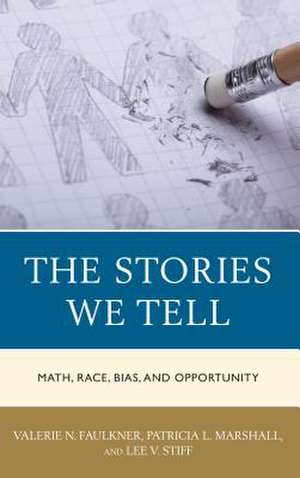STORIES WE TELLMATH RACE BIASPB
Autor Lee V. Stiffen Limba Engleză Paperback – 28 aug 2019
Preț: 340.31 lei
Nou
Puncte Express: 510
Preț estimativ în valută:
65.14€ • 70.78$ • 54.75£
65.14€ • 70.78$ • 54.75£
Carte tipărită la comandă
Livrare economică 21 aprilie-05 mai
Preluare comenzi: 021 569.72.76
Specificații
ISBN-13: 9781475841633
ISBN-10: 1475841639
Pagini: 158
Dimensiuni: 152 x 229 x 15 mm
Greutate: 0.25 kg
Editura: Rowman & Littlefield
ISBN-10: 1475841639
Pagini: 158
Dimensiuni: 152 x 229 x 15 mm
Greutate: 0.25 kg
Editura: Rowman & Littlefield
Notă biografică
Dr. Valerie N. Faulkner is a Teaching Associate Professor in Elementary Education in the Department of Teacher Education and Learning Sciences at NC State University. Her current work focuses on K-2 mathematics education and issues of access and equity within schools.
Dr. Patricia L. Marshall is a Professor of Multicultural Studies in the Department of Teacher Education and Learning Sciences at NC State University. She is interested in the impact of elements of culture including race, class, language on the teaching-learning process and teachers¿ acquisition of cross-cultural competency.
Dr. Lee V. Stiff is Professor of Mathematics Education in the Department of Science, Technology, Engineering, and Mathematics Education and Associate Dean for Faculty and Academic Affairs in the College of Education at NC State University. He is interested in affecting change that promotes the mathematics education of all students by effectively using data to better align existing resources to address issues of equity, student access to high-quality math courses, and course placement disparities.
Cuprins
Acknowledgements
Introduction
Section I- The Gap-Maker
Chapter 1- The Farce of Early Identification: A Hidden Story in Gap-Making
The Promise of Promise
Talent Development
The Flawed Pillars of Early Identification
Talent is Detected in the Young
Talent is Innate
A Restricted Talent Pool is Desirable
The Story of Early Identification
Chapter 2- Data Doppels: Professional Stories and Gap-Making
Data and High-Stakes Decision-Making
Beware the Data Doppel
Decision-Making and Data Doppels in Action
Heart Attacks and the Goldman Index
Symphony Orchestras and Blind Auditions
Baseball and Moneyball
Data Doppels in Schools
What student data drives mathematics opportunities?
The ¿At-Risk¿ Model
An imagined conversation
Remediation as Elevation
Data Doppels in Math Class
National Data and Middle School Mathematics Placement
How Should We Think About This?
Section II- Academic Opportunity in Schools
Chapter 3- Diversity in Our Schools: Cultural Preconceptions & Instructional Choices
Multiple Dimensions of Student Diversity in Schools
New Normals, Societal Scourges and Childhoods Lost?
Intersecting Social Axes and Opportunity Gaps for Other People¿s Children
Beyond Diversity & The Abyss of Accountability
Homogeneous Ability Grouping: The Smoke and Mirrors of Effective Teaching?
Early Identification and Mindset in Grouping for Instruction
Perceptions and Scapegoats
Gap-Making through Teacher Decision-Making
Cultural Difference as a Factor In Teachers¿ Decision Making
Teacher Preconceptions: Critical Indicators of Student Learning Potential?
Heterogeneous Groups and Growth Mindset: Toward Neutralizing Problematic Decision Making
Troubling Stratification
Chapter 4- Follow the Data: Gifts, Access, Cuts, and The-Gap
Rigor for All
Different Strokes
A Brief History of Giftedness
Access to the Gift
The Cut
Following Data
Campbell¿s Law
Beyond Gifted
The Referral Pool
Gap-logic
The Achievement-Gap Mean
Variance and Variety
The mean doesn¿t mean what you think it means
Finding Students
Section III- Decision Making in Schools
Chapter 5- When Teachers Push Back: Data vs. Belief
Mathematics Course Placements
The Placement Decision
The Professional Beliefs
Adjustments: Changing the Terms of Engagement
The Rules
The Case of Alexander
The Case of Laila
The Case of Inconsistent Leadership
Cumulative Impact
Data vs. Beliefs
The Path of Most Resistance
Chapter 6- Unpacking Belief and Finding Change
Unpacking Belief: Data & the Brain
Confirmation Bias
Certainty, Doubt & Confabulation
Cultural Norms, Race, and Belief
Finding Change
#1 Recognize Conceptual Race
#2 Free the Data, Free the Mind(set)
#3 Less is more
The Discomfort, and Reward, of Change
Appendix- Chapter by Chapter Questions
Bibliography
About the Authors
Descriere
This book covers topics from the early identification of talent, using demographic characteristics to make academic decisions, and the casting of a 'gap' in mathematical performance as about the students themselves. Educators are making decisions about students that contribute to the very gaps in achievement we strive to overcome.
